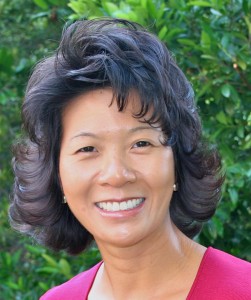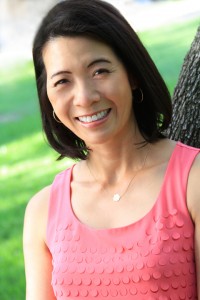“Hey, did you know Lois is Chinese?” This is an inside joke I have with some friends, referring to an occasion when I’d half-jokingly asked this of someone I’d just met, thinking it impossible that someone could not know my heritage. While I’d like to say that I’ve always been perfectly comfortable with my heritage, the truth of the matter is that hasn’t always been the case.
Much to my own surprise, I found myself reacting strongly last week to the confession from Julie Chen, one of the hostesses of CBS’ The Talk, that she’d had cosmetic surgery early in her career to widen her eyes, in essence to look less Chinese. “How fucking ridiculous is that?!” I’d thought to myself.
After revisiting the story and trying to figure out why was I so repulsed, I came to the poignant realization that I, too, had done my share of trying to blend in for most of my life. While I’ve never done anything as extreme as cosmetic surgery, I recognized that lurking behind all the years of unnatural feats to alter my hair was my subconscious attempt to look more like everyone else.
Growing up in the Midwest where I was the only person of Asian descent in school except for a year here and there, I was painfully self-conscious that I didn’t look like the other kids. Early on in grade school, kids had teased and taunted me for being ‘the Chinese girl,’ so I’d erroneously concluded there was something wrong with me, and the only way to stop the hateful remarks would be to blend in.
I remember waiting with great anticipation for the day my parents allowed me to get my first perm. Surely curly hair would help me fit right in? Ha. The results of my mother’s well-intentioned home perm rendered a Chinese version of Gilda Radner’s Roseanne Roseannadanna. Adding insult to injury of my tender pre-teen ego, my oh-so-sensitive father had sarcastically asked, “You know that Chinese people don’t have Afros?”
That awful outcome was my first and last home perm, but it began a decades-long fascination with chemical and mechanical manipulation to make my hair look different. Professional perms to curl my hair, to give my hair more body, to straighten my already straight hair into behaving how I wanted, even color as far from natural as imaginable.
It remains to this day one of my best friend’s memories how I’d waltzed into a college class with a purple aura from the henna treatment that had been promised to ‘bring out more of the natural highlights’ in my hair.
So why did I go to all the trouble and expense? My answer may not be that far from Julie Chen’s rationale for surgery. Although my professional aspirations have never dictated my appearance for success, I see a common theme of desiring to fit in because the comments of a few made us believe we were inadequate as is.
There’s something inherently hypocritical that, in a country built on the foundation of freedom of self-expression, we still subject one another to overt racism and discrimination because of our differences.
Is this really the world in which we want to live?
I count my blessings that I finally reached a place in my life where I’m not only comfortable with my heritage, I take great pride in it. The Chinese girl is simply who I am, and I have no desire or need to hide it. No, I don’t look like most of my friends or even the community in which I live, but that’s the beauty of this great country of ours.
About seven years ago, I at last decided to kick my hair habit and go au naturel, to embrace the beauty of Mother Nature instead of continuing the inane, expensive plight to fight her. At the coaxing of my rock star stylist, I began the long process of growing out my final perm to give way to naturally straight hair, something he’d been trying to convince me to do since the day we met in 2001. (I still don’t know how exactly I’d convinced him to make a stinking exception when he’d politely informed me, “I don’t do perms.”)
I recognize now that my anger at Julie Chen’s confession is actually a reflection of anger with myself as well as with the world. I don’t like that I haven’t always had the courage to stand proudly in my own skin, and I don’t like that intolerance still pervades in our society.
But my anger is quickly extinguished by hope. Through my own experience of coming to terms with who I am and embracing all of me, I know it is possible to evolve, to open our minds and to accept ourselves and each other just as we naturally are.
The bold stand for tolerance begins with ourselves. Is there a part of you that you may not even be aware you’re disguising or hiding because of your own discomfort?
Dare to shine the light on your true beauty. When we accept and love ourselves first, it’s amazing how the rest of the world follows our lead.




